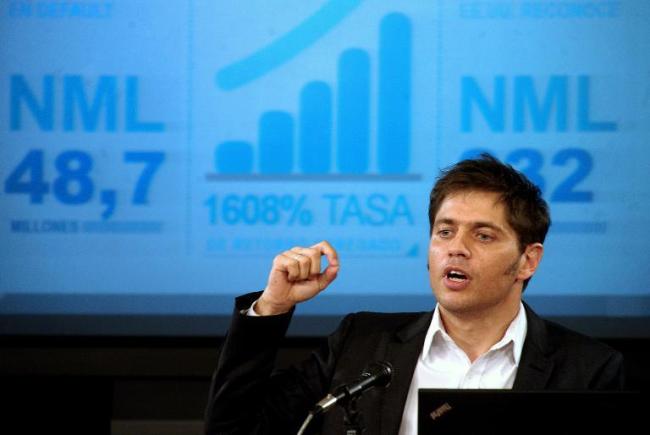BUENOS AIRES (AFP) ― After the devastating debt crisis of 2001, Argentines have become rather sanguine about economic strife.
And for now, many are more focused on the country’s World Cup hopes than the latest ― very complicated ― financial crisis.
Some experts fear the country is edging toward another default after a U.S. court victory for the hedge funds who hold bonds but did not take part in a restructuring deal after 2001.
Not that many Argentines are panicking.
“That doesn’t interest us,” said Rolando Perez, a 58-year-old newspaper merchant in Buenos Aires.
“What’s important for Argentina right now is the money in our pockets, our children, security and the World Cup.”
 |
| Argentina’s Economy Minister Axel Kicillof speaks during a press conference in Buenos Aires on June 17. (AFP) |
Sociologist Jorge Giacobbe explained that at the moment, the 40-million-strong population is turning a blind eye toward the latest twists and turns in the lengthy legal battle, with the end result still unknown.
“The finance and business communities are worried, but most people think nothing will happen. They’re not up to date with what’s going on,” Giacobbe said.
Earlier this week, the U.S. Supreme Court refused to take up Argentina’s appeals against paying at least $1.3 billion to hedge fund investors in its defaulted bonds, piling major pressure on the country’s shaky finances.
Argentine President Cristina Kirchner and her Economy Minister Axel Kicillof have thus far tried to reassure the people, urging them to remain calm and pledging to defend the country’s interests.
Kirchner on Friday signalled her willingness to enter talks on the debt issue, but a U.S. judge ruled that Buenos Aires must pay its debts in the United States, throwing cold water on Kicillof’s proposal to settle it inside the country.
For sociologist Guillermo Perez Sosto, the country’s economic woes have no chance of registering while Lionel Messi leads Argentina’s national football squad in its quest for World Cup glory in Brazil.
“Their concerns are more concrete. For now, no one is suffering the consequences, so it’s all a bit abstract. It’s also very technical. It’s a matter for bankers, economists, politicians and experts,” Perez Sosto said.
Perez Sosto said he remembered the riots in December 2001, the cacophonous pot-banging at mass protests and the despair of men and women who lost their savings and their jobs.
“If there is another default, I doubt we’d end up in a crisis like we had in 2001,” he said.
It’s true that Argentina’s current situation is nothing like that experienced back then.
In 2001, the South American country had just slogged through three years of recession, was crumbling under a mountain of debt and the unemployment rate was high.
Today, Argentina is on the brink of tumbling back into recession, but the jobless rate is low and the trade balance is in the black.
Alicia Rodriguez, a 45-year-old bank employee, says making ends meet ― not the country’s wider economic problems ― is what matters.
“What counts above all is making it to the end of the month. Our biggest concern is that prices are constantly on the rise. That’s the reality,”
Rodriguez said.
While Argentines are never shy about heading into the streets to voice their grievances, no major protests have cropped up in recent days.
In an isolated incident, a small group of far-left militants burned the American flag in front of the U.S. embassy in Buenos Aires after the announcement of the Supreme Court’s decision.
Argentina, a model student of the International Monetary Fund in the 1990s, defaulted on nearly $100 billion in debt in 2001, the biggest default in history.
Since that time, South America’s third-largest economy has righted itself without the aid of international financial institutions, mainly thanks to lucrative farm exports.
Buenos Aires has paid back $150 billion to its creditors and its total debt now represents about 40 percent of its gross national product.
Its next payment is due on June 30. Buenos Aires has said it cannot make that payment as ordered by the U.S. judge.
“I think the court ruling is unfair,” said Lucia Menendez, a 21-year-old philosophy student. “We’re just emerging from the crisis and they want to put our head back under water.”

